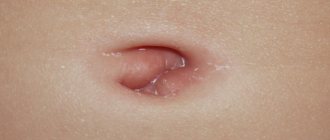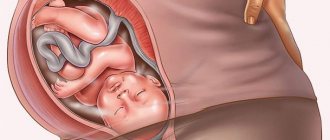When it’s the 3rd obstetric week, you can safely say that you are pregnant. The 1st week of the embryonic period begins from this moment. It is at this time that you experience the main event - fertilization. Right now, a lot of important issues are being decided - what gender the baby will have, what color of eyes and hair he will get. Other characteristics are also formed at this stage - a specific set of chromosomes is responsible for this.
How many weeks is 1st trimester?
When determining the duration of pregnancy, there is another unclear aspect that you need to learn more about. We have already learned that the duration of pregnancy is forty weeks. Moreover, the number 40 cannot be divided by 3 without a remainder. That is, the duration of each trimester may vary.
Some literature reports that the 1st trimester ends after the 12th week, others say that after the 13th - there are many such examples. Don't bother yourself with this information. The main sign by which you will understand that the trimester is over is the moment when vomiting and nausea stop tormenting you in the morning. Why do you feel sick in the early stages?
Symptoms of pregnancy at 3 weeks
Despite the fact that the signs of embryo implantation are individual for each pregnant woman, there are also those that are felt by most women. Symptoms of pregnancy at 3 weeks are:
- Increased sensitivity of the mammary glands;
- Changes in taste preferences;
- An increase in basal temperature indicators;
- Severe fatigue;
- Nausea, early toxicosis;
- Increased urination;
- Bloody discharge without unpleasant sensations, which indicates implantation of the egg to the walls of the uterus;
- Sudden changes in mood;
- Increased sense of smell, intolerance to strong odors;
- Stomach upset due to hormonal changes.
The most common signs are changes in the mammary glands, discomfort in the abdominal and lumbar region, implantation discharge, as well as cold symptoms, which we will talk about below.
Approved medications
Separately, we need to talk about medications that the expectant mother is forced to take on an ongoing basis.
- Be sure to consult with your doctor about the possibility of continuing treatment with your chosen medications during pregnancy.
- Be sure to make sure that medications prescribed before pregnancy have no contraindications for taking while pregnant.
Do not prescribe treatment for yourself; take all medications strictly as prescribed by your doctor.
Discharge at 3 weeks of pregnancy
At the end of the second and beginning of the third week of pregnancy, a woman experiences bloody discharge from the vagina, indicating implantation of the egg. They are provoked by a violation of the integrity of the uterine wall, where the egg is actually attached. In addition to light brown discharge at 3 weeks of pregnancy, an unpleasant tingling sensation in the abdominal area and lower back may also indicate an interesting situation.
Some mothers may have a slight aching pain, but there should not be severe pain like during menstruation. There is no need to worry about this, just as you should not confuse discharge with menstrual flow, since unlike the latter, they last about forty hours, exactly as long as the period of fixation of the egg in the uterus.
Women often begin to suspect their “interesting situation” only after they discover a delay. It is necessary to take into account the fact that for the normal course of gestation neither menstruation nor ovulation are characteristic and they will be absent for all nine months. The reason for this behavior of the body is a change in the concentration indicators of sector elements.
From the 3rd week of pregnancy, the ovaries begin to actively produce female sex hormones. So, progesterone will begin to increase at week 3 and will be equal to 50 nmol/l, estrogen will also increase. Gynecologists note that bleeding during the 3rd week of pregnancy can have different volumes. However, they must be uniform and not have an unpleasant odor. Their color can also vary from pinkish to brown.
If the discharge is different from normal, has an unpleasant odor, or lasts more than 40 hours. At the same time, a woman suspects that she is pregnant, she should contact a specialist and be examined for the presence of infection.
If you are already in the fourth week of pregnancy and want to know the signs and symptoms of this period, as well as the impact of colds and alcohol. You can find the necessary information in this article.
Recommendations for the expectant mother
To ensure optimal conditions for the life born in your body, it is recommended to follow some rules:
- try to maintain a daily routine. A pregnant woman needs to get enough sleep to fill her body with strength for the painstaking work of creating a new person. You should sleep at least 8 hours a day;
- avoid harmful foods. The correct diet of a pregnant woman is an important component in the process of embryo formation. With food, the expectant mother replenishes the missing elements in the body, ensuring not only the development of the unborn child, but also protecting her own body from exhaustion. Nature provides an option when a sufficient amount of vitamins and minerals does not enter the female body with food. In this case, the body will take them from the pregnant woman’s reserves, which will immediately affect the condition of the woman’s skin, hair, nails and general well-being;
- to refuse from bad habits. Alcohol, active or passive smoking, consumption of harmful foods should be completely avoided;
- do not overwork, avoid heavy physical labor. A new life is developing in your body, allow your body to direct all its strength to this process;
- reduce the load on sports training. It is advisable for active mothers to avoid strength training and grueling activities. Most gynecologists agree that the best sports activities for a pregnant woman are swimming and yoga. But always focus on how you feel. If you have always been involved in some kind of sport and do not want to change it, then simply reduce the intensity;
- do not lift heavy objects. When you pick up a heavy object, you tense your abdominal muscles. In the 3rd obstetric week of pregnancy, this can provoke spontaneous miscarriage;
- avoid crowds of people. This recommendation will help you reduce your risk of disease;
- an illness that requires treatment, especially with antibiotics, can negatively affect the development of the embryo;
- avoid stress. Cortisol and adrenaline, which are released during stress, can negatively affect your well-being and the condition of the fetus.
Fetal development 3 weeks of pregnancy
All mothers, without exception, are interested in the question of what happens to the fetus at 3 weeks of pregnancy. Let's look at this topic in detail so that visitors to our portal can get all the information they are interested in.
The nucleus of the egg and sperm consists of half the chromosome set. And only after fertilization occurs at the end of the second week, the first cellular structure of the zygote is formed, which gives rise to a new life. It will already contain 46 chromosomes, half of which will be paternal and half maternal.
After the zygote has formed, it begins to divide, forming new cellular structures. 64 hours after implantation occurs, the embryo becomes similar to a blackberry and includes from 15 to 30 identical cells.
Once the egg merges with the sperm, it will move through the fallopian tubes into the uterine cavity for 4 days. The future baby will be born inside the blastocyst. Once in the uterus, the egg will attach to the endometrial layer. This process lasts for 40 hours. If rejection does not occur, then by the end of the third week the embryo will be securely attached to the nutrient layer of the endometrium.
After this happens, connections will begin to be created between the body of the mother and the future baby. From the very beginning, the blastocyst begins to produce the sectoral elements required for the development of the embryo. They enter the bloodstream and can be used to determine the presence of pregnancy. These hormones include choriotropin, progesterone and estrogen.
In the third week, a special protein begins to be produced, which weakens the mother’s body’s defenses. This is done so that the mother’s body does not reject the embryo, since it considers it foreign and is trying to get rid of it.
So what does the fetus look like at 3 weeks of pregnancy? By the end of this period, it reaches a length of 0.18 millimeters and weighs 3 micrograms, and the number of cells in it will increase to 250. Despite its microscopic size, it is already beginning to influence the body of the expectant mother, leading to its noticeable restructuring.
Visiting an obstetrician-gynecologist
Visiting an obstetrician-gynecologist
A visit to the gynecologist in the 3rd obstetric week of pregnancy is not necessary. An exception may be women who carefully plan their pregnancy to confirm the onset of ovulation. Using an ultrasound, the doctor will detect a burst follicle on the ovary, which has already begun to transform into a corpus luteum.
- An ultrasound of the fetus in the 3rd week of pregnancy (according to obstetric calculations) is usually not performed. The life that originates in a woman’s body is still so small that it is not always possible to see it.
- At the 3rd obstetric week of pregnancy, a fetal ultrasound is prescribed only if an ectopic pregnancy is suspected (for more details, see the section “Problems in the 3rd week of pregnancy”).
- It is too early to take blood and urine tests at this time. The changes that have occurred in the body are not yet significant and are practically not noticeable in general tests. Usually, the expectant mother receives her first referrals for tests at 5-6 weeks of pregnancy. An exception is made for a blood test for hCG - it can be taken as early as the 4th week.
Pain in the abdomen and other parts of the body
During the normal course of pregnancy, in the 3rd week there is no severe pain in the abdomen or other parts of the body. A nagging pain sensation in the lower abdomen is possible 10–12 days after fertilization, 19–21 days after the start of the last menstruation. This is due to the implantation of the embryo into the uterine cavity. With moderate severity of this symptom, there is no threat to the mother and the unborn baby.
For what kind of pain should you contact a gynecologist:
- acute, increasing pain in the lower abdomen;
- pain on the right or left below the navel;
- constant, aching pain in the lower abdomen, intensifying when pressed.
Discharge
At the beginning of the 3rd obstetric week of pregnancy, the discharge may increase slightly. They are usually white, thick, dense, odorless. By the end of the week, brown, red or pink smears may appear - this is a normal consequence of the beginning of implantation of the embryo in the uterus.
If you notice that the discharge has suddenly begun to change color or an odor has appeared, you need to contact a gynecologist to determine the reasons for this change.
Bleeding
Normally, there should be no bleeding in the 3rd week of obstetric pregnancy.
Bleeding is a serious reason to consult a gynecologist.
Miscarriage at 3 weeks of pregnancy
At this stage, as well as in the second week of pregnancy, a miscarriage can hardly be distinguished from the onset of menstruation. The only difference between it and menstrual flow is that, along with the discharge, the woman will notice a large bloody clot, which will be an unattached fertilized egg.
The causes of miscarriage at 3 weeks of pregnancy may be a stressful situation experienced, hormonal imbalance, genetic abnormalities of the unborn fetus, or the presence of inflammatory processes in the organs of the female reproductive system.
To avoid rejection of the fertilized egg, you should carefully plan your pregnancy, exclude all kinds of ailments, take vitamins and, of course, not worry for no reason.
Nutrition
Tips on the diet of a young mother
To provide the newly born life with everything necessary, you need to carefully monitor your diet in the 3rd week. Do not overload your body and overeat; it is best to observe moderation.
The diet of the expectant mother should include:
- lean meat and poultry;
- fatty fish;
- dishes made from legumes rich in folic acid;
- a wide range of dairy products: cottage cheese, kefir, yoghurts, cheeses, cottage cheese, etc.;
- vegetables and greens in large quantities;
- fruits;
- berries;
- cereals.
To optimize weight gain, throughout pregnancy it is advisable to exclude white bread from the diet, replacing it with coarse dark varieties. You can find more detailed information about nutrition in the article nutrition during pregnancy.
Vitamins
Essential vitamins in the third week of pregnancy
At the 3rd week of pregnancy (according to obstetric calculations), the expectant mother can and should take vitamin complexes. It is up to your doctor to decide which of the many options is right for you.
All pregnant women are required to take folic acid (vitamin B9) - this is a recommendation that cannot be ignored.
Many gynecologists now recommend a form of methylfolate. It is more easily absorbed by the body.
In many regions, expectant mothers are prescribed to take Iodine and vitamin E. Consult your doctor before taking it.
Sex at 3 weeks pregnant
Usually sex at 3 weeks of pregnancy becomes a real problem for a woman. The reason for this is not only a decrease in sexual desire against the background of hormonal changes, but also early toxicosis, as well as increased sensitivity of the breast, touching which causes pain and discourages any desire for intimacy.
If a woman is predisposed to miscarriage and has already had miscarriages in the past, then it is better to refuse sexual contact due to the fact that:
- Against the background of hormonal changes, the central nervous system becomes overly excitable, which affects the muscles of the uterus and the muscles of the abdominal region. During sex, they will contract, which means they can reject the attached egg.
- During orgasm, the pulse begins to rise, and with it the pressure rises. And since at the 3rd week of gestation the egg is not yet very firmly attached to the wall of the uterus, increased pressure can lead to its rejection.
But despite this, there is no clear prohibition on sexual relations during this period. Making love has a positive effect on the body, keeping the muscular system and heart in good shape. And the endorphins produced in the process improve the mood of the expectant mother.
However, you should refuse sex if there is a clear threat of miscarriage or if your partner has infectious diseases of the reproductive system. In other cases, sex is not prohibited.
Unwanted pregnancy
By the way, if the resulting pregnancy is undesirable for a woman and her partner for some significant reason, then 3 weeks is the most appropriate time to terminate the pregnancy (abortion). An unwanted pregnancy can happen for a completely banal reason - the irresponsible attitude of partners towards contraception. But it also happens that, even with protection, a woman is able to conceive a child.
When making a decision about an abortion, it is necessary to weigh everything repeatedly; such a decision must be made mutually. It is important that the abortion takes place under the strict supervision of an experienced gynecologist. Under no circumstances should you take any action on your own; every woman should understand that this is fraught with serious consequences, even death. Therefore, you should not take risks, but you need to seek help from doctors.
Sex
During the 3rd week of pregnancy, sexual activity is not prohibited. The main condition is mutual desire.
In some women, due to the appearance of symptoms similar to the onset of menstruation, there is a significant decrease in attraction to the opposite sex. In such a situation, you need to talk with the father of your unborn child, explain that this is due to changes taking place within you and does not affect your attitude towards him. Don't force yourself to do something you don't want to do.










